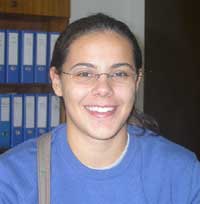 PUZZLES AND LIFE PUZZLES AND LIFE
I know that people suggest sports in your spare time to have a healthier life. But if you
have some free time after your sporting activities, try puzzles, which may be the sports
for your soul and mind. When I try to complete a jigsaw puzzle, I feel that I am finding
the missing pieces in my soul. In the first minutes while I am trying to concentrate on
finding pieces I feel like my mind is being cleansed of daily stresses. When my mind is
emptied of negative ideas, I find myself thinking of a memory (might be good or bad, there
is no difference at this stage) and analyzing my own behavior at that time. While I try to
concentrate on finding the missing pieces I also fix and find the missing pieces of my
soul. I think that this is because I spend time on my own with my thoughts, and this
relaxes my mind. Building a puzzle cures my mind by taking out the stressful pieces,
because I feel as I find the puzzle pieces that I am achieving a task. This matching and
completing process is enjoyable and more relaxing. And nothing seems more fun to me than
spending a half hour across a puzzle trying to find the missing pieces, along with a cup
of coffee and a comedy mini series on the TV. Or, on a Friday night when you just want to
spend a quiet night, a puzzle is also a good choice.
There was time when our lives were not invaded by television or computers, when people had
to entertain themselves. People turned to jigsaw puzzles. By sitting on the floor or
around a table they worked on the puzzle. While they worked, they talked about daily
events, about their memories and their dreams. They were relaxing and having fun. I think
that I am doing the same thing but the only difference is I prefer to socialize with my
mind, because during all the stressful days, we do not have the time to listen to
ourselves. In Turkish the word puzzle indicates "jigsaw puzzle," which now
denotes a picture printed on cardboard cut into funny shapes. These shapes are brought
together to build the picture. But in English puzzle is a generalized name for a problem
or riddle that challenges creativity. Some examples of puzzles include jigsaw puzzles,
crosswords, Rubik's cube and Sudoku.
John Spilsbury invented the jigsaw puzzle in 1760. He was a London engraver and mapmaker.
He mounted one of his maps on hardwood and cut around the borders of countries using a
jigsaw - hence, “jigsaw puzzle.” Then it was used as an educational pastime to aid
children. Until the 1820s they were used as educational tools. Now puzzles are used as to
pass time and also as an educational tool. For instance, my cousin's foundation for his
geographical knowledge was built with world puzzles. And I do puzzles to relax. I hope you
will have an excellent week and an excellent holiday full of finding the missing pieces of
your souls.
Sýla Türkü
Kural (EE/III)
turku@ug.bilkent.edu.tr
 |







